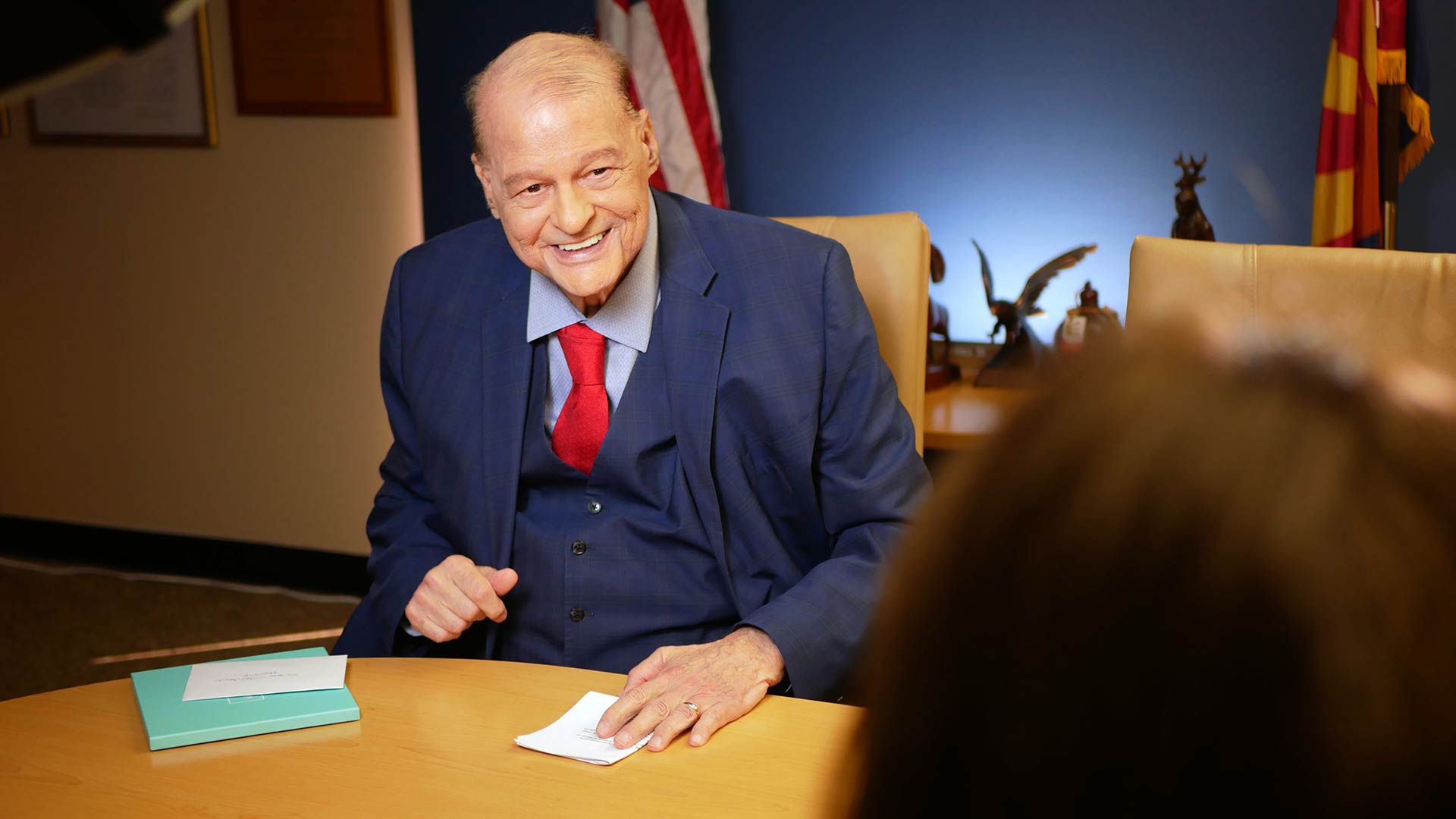 Arizona Superintendent of Public Instruction Tom Horne presented his 2025 State of Education Speech to the AZ Senate Committee on Education on Tuesday, Jan. 21, 2025.
Arizona Superintendent of Public Instruction Tom Horne presented his 2025 State of Education Speech to the AZ Senate Committee on Education on Tuesday, Jan. 21, 2025.
Arizona Superintendent of Public Instruction Tom Horne delivered his 2025 State of Education speech to the Arizona Senate Committee on Education on Tuesday.
Horne began by thanking committee members for approving a bill sponsored by Chair Matt Gress that expands the school safety program to cover costs of school safety officers– an initiative that Horne has strongly advocated for.
He pointed to a recent incident at a Tucson school where a school safety officer was present to arrest a trespasser.
HB2074 also instructs schools to submit current school blueprints to law enforcement and emergency services.
“Some opponents say they want gun-free schools, saying you want a gun-free school is like saying I'm an easy victim, come get me,” Horne said.
Horne then addressed what he called “philosophical issues” including the teaching of Critical Race Theory (CRT).
“Focus on racial preferences does not do anything to encourage hard work, conscientiousness or creativity,” Horne said.
Merriam-Webster defines CRT as, “A group of concepts such as the idea of race is a sociological rather than biological designation and that racism pervades society and is fostered and perpetuated by the legal system used for examining the relationship between race and the laws and legal institutions of a country and especially in the United States.”
“Parents will be informed if the schools are serious about teaching academics or promoting woke ideology,” Horne told the committee.
He also took aim at transgender student athletes
“Biological males have no business in girls' sports, showers or lock rooms,” noting that he is actively fighting this battle in court.
In September, a federal appeals court upheld a decision to block Arizona from enforcing a law that banned transgender students from participating in school sports.
The court found Horne and other appellants could not prove the ban was related to ensuring competitive fairness for female student athletes.
Horne went on to present his 15 priorities for 2025, including improving test scores and teacher retention and improvement.
“More teachers are leaving the profession than are coming into our classrooms,” he said.
Horne moved on to the renewal of Proposition 123. The 2016 voter-approved ballot measure boosts the amount of funding K-12 public schools receive from the State Land Trust, “which is overflowing with money to increase teacher salaries.”
He added that the aggregate expenditure limit must be dealt with to avoid last-minute teacher layoffs due to a lack of funding.
Additional priorities included leadership training and data-informed instruction, encouraging low-performing schools in low-income areas to learn from similarly situated schools with better outcomes.
Horne criticized schools he said are issuing fraudulent diplomas, pointing to those with 80% or 90% graduation rates and proficiency rates under 10%.
He advocated for reinstating a version of the Arizona Instrument to Measure Standards (AIMS) a standardized test, as a graduation requirement or alternative certification in a trade through career and technical education programs.
Horne also talked about improving elementary reading proficiency and restricting bilingual education to teach English language learners.
Other initiatives included offering better education for college students studying education, expanding career and technical education programs, supporting professional development in rural areas, tutoring and character education.
He highlighted administrative streamlining through reducing the amount of questions for the Comprehensive Needs Assessment (CNA) and testing time for kindergarten teachers.
He also promoted the Arizona Digital Education Library as an teaching resource including materials like Khan Academy and the controversial Prager University– a nonprofit advocacy group known for its conservative online content.
Horne then praised the artificial intelligence-powered tool, Khanmigo developed by Khan Academy, as a tool for teachers.
“It does not substitute for teachers, it helps them,” he said.
The department has invested $1.5 million in Khanmigo to support its first 100,000 students, with an additional $25 charge per student thereafter.
He closed his speech by addressing the contentious Empowerment Scholarship Account (ESA) program, which has faced scrutiny over reports of questionable spending.
During her State of the State address, Governor Katie Hobbs criticized the program, calling it a “billion-dollar boondoggle” that has cost taxpayers $1 billion.
According to the department, 85,024 Arizona students currently benefit from ESAs.
In response to Hobbs’ criticism, Horne issued the following statement:
“Under my leadership, the department has done a full-court press against waste and fraud. I hired both a program auditor and an investigator, which had not been done before. I require that every expenditure be for a valid educational purpose and have been attacked for doing that. The Governor needs to pay more attention to what is going on. She gets an ‘F’.”

By submitting your comments, you hereby give AZPM the right to post your comments and potentially use them in any other form of media operated by this institution.